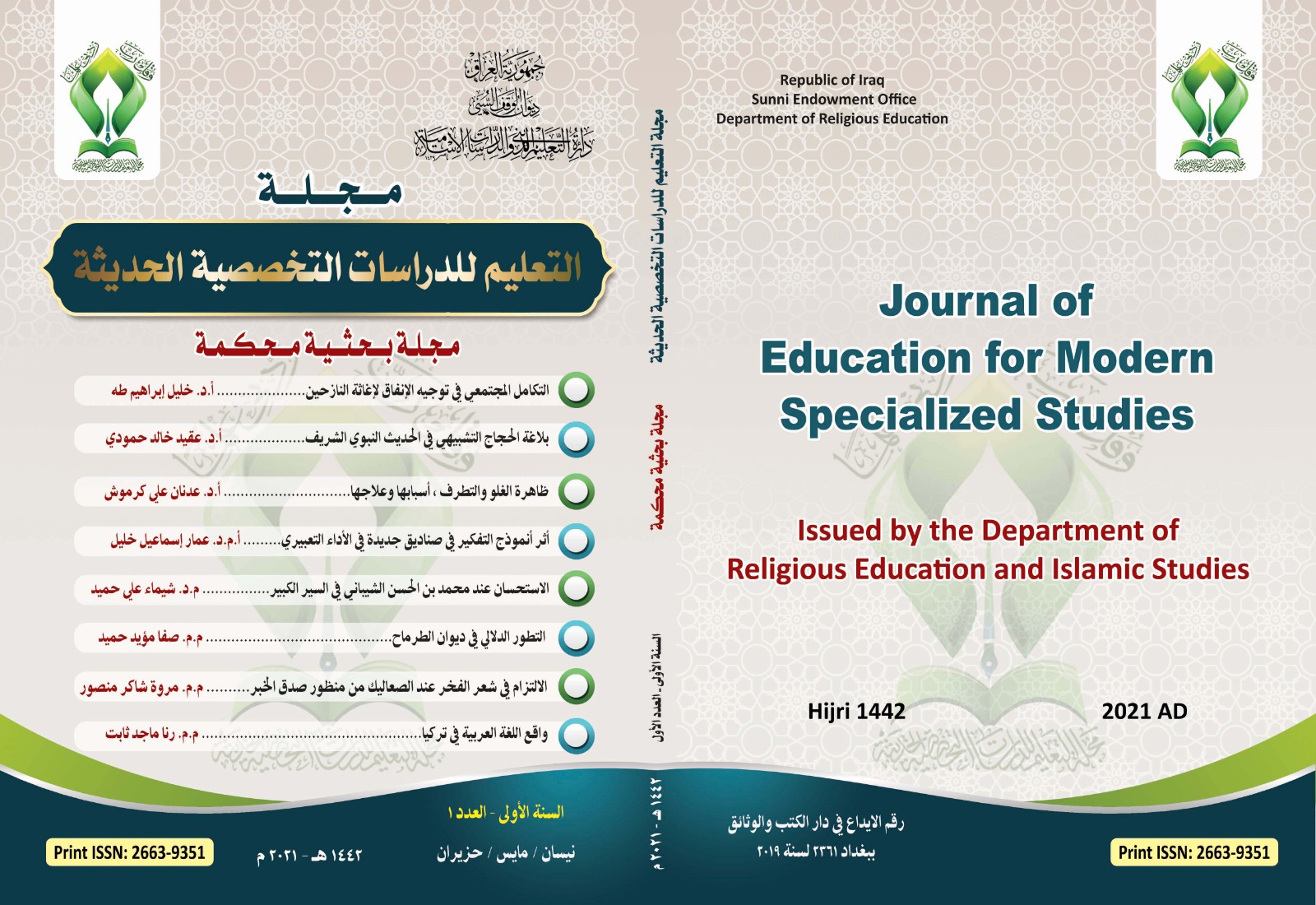Abstract
This research was concerned with correcting the transmission reported
by the fundamentalists in the book Al-Bahr Al-Muhit by Al-Zarkashi، and he
corrected it himself، by conveying the opinion and those who transmitted
it and those who supported him in this transmission. Then he mentioned
his correction reported by Imam Al-Zarkashi himself، and those who
supported this correction.
This research has concluded that the narrations have varied among the
topics of the principles of jurisprudence. They were in linguistic principles،
as in the issue of (the originator of the language)، and in the topics of
words between the topics of prohibition، in two issues: (the necessity of
the absolute prohibition of repetition or not) and the issue of (Required by the forbidden act
For its own sake، for corruption or not) and in the general investigations،
in three issues: (acting with the general before looking for the specific)،
(what matters is the generality of the word or in relation to the reason)
and (the generality in the Almighty’s saying: “Take from their wealth as
charity}) and in the joint investigations، in the issue: (Using the common
word in its meanings)، and that all of Imam Al-Zarkashi’s corrections of
the narrations reported by the scholars that he mentioned in his book
Al-Bahr Al-Muhit were correct، except for one issue، which is the issue of
(whether or not the absolute prohibition of repetition is necessary)، and
among the results that the research reached is that Imam Al-Zarkashi used
to transmit sayings in the words of their authors as they were، and he
used to document them from their sources and their context، especially
when the transmission differed from them.
by the fundamentalists in the book Al-Bahr Al-Muhit by Al-Zarkashi، and he
corrected it himself، by conveying the opinion and those who transmitted
it and those who supported him in this transmission. Then he mentioned
his correction reported by Imam Al-Zarkashi himself، and those who
supported this correction.
This research has concluded that the narrations have varied among the
topics of the principles of jurisprudence. They were in linguistic principles،
as in the issue of (the originator of the language)، and in the topics of
words between the topics of prohibition، in two issues: (the necessity of
the absolute prohibition of repetition or not) and the issue of (Required by the forbidden act
For its own sake، for corruption or not) and in the general investigations،
in three issues: (acting with the general before looking for the specific)،
(what matters is the generality of the word or in relation to the reason)
and (the generality in the Almighty’s saying: “Take from their wealth as
charity}) and in the joint investigations، in the issue: (Using the common
word in its meanings)، and that all of Imam Al-Zarkashi’s corrections of
the narrations reported by the scholars that he mentioned in his book
Al-Bahr Al-Muhit were correct، except for one issue، which is the issue of
(whether or not the absolute prohibition of repetition is necessary)، and
among the results that the research reached is that Imam Al-Zarkashi used
to transmit sayings in the words of their authors as they were، and he
used to document them from their sources and their context، especially
when the transmission differed from them.
Keywords
correction / transportation / scholars / Al-B
Abstract
اهتم هذا البحث بتصويب النقل الوارد عن الأصوليين في كتاب البحر المحيط للزركشي، وصححها
هو بنفسه، وذلك بنقل الرأي ومن نقله ومن أيده في هذا النقل، ثم ذكر تصويبه الوارد عن الإمام الزركشي
نفسه، وممن أيد هذا التصويب. وقد توصل هذا البحث إلى: أن النقولات قد تنوعت بين مباحث من أصول
الفقه، فقد كانت في المبادئ اللغوية، كما في مسألة )واضع اللغة(، وفي مباحث الألفاظ ما بين مباحث
النهي، في مسألتين هما: )اقتضاء النهي المطلق للتكرار من عدمه( ومسألة )مقتضى الفعل المنهي عنه لذات ه
للفساد من عدمه( وفي مباحث العموم، في ثلاث مسائل: )العمل بالعام قبل البحث عن المخصص(،
)العبرة بعموم اللفظ أم بخصوص السبب( و)العموم في قوله تعالى: ﴿خُذْ مِنْ أَمْوَالِِمْ صَدَقَةً﴾( وفي
مباحث الاشتراك، في مسألة: )استعمال اللفظ المشترك في معانيه(، وأن جميع تصويبات الإمام الزركشي
للنقولات الواردة عن العلماء التي ذكرها في كتابه البحر المحيط كانت صحيحة، سوى مسألة واحدة
ألا وهي مسألة )اقتضاء النهي المطلق للتكرار من عدمه(، ومن النتائج التي خلص إليها البحث هي أن
الإمام الزركشي كان ينقل الأقوال بعبارات أصحابها كما هي، وأنه كان يوثقها من مصادرها ومن مضانها،
خصوصاً عند اختلاف النقل عنهم.
هو بنفسه، وذلك بنقل الرأي ومن نقله ومن أيده في هذا النقل، ثم ذكر تصويبه الوارد عن الإمام الزركشي
نفسه، وممن أيد هذا التصويب. وقد توصل هذا البحث إلى: أن النقولات قد تنوعت بين مباحث من أصول
الفقه، فقد كانت في المبادئ اللغوية، كما في مسألة )واضع اللغة(، وفي مباحث الألفاظ ما بين مباحث
النهي، في مسألتين هما: )اقتضاء النهي المطلق للتكرار من عدمه( ومسألة )مقتضى الفعل المنهي عنه لذات ه
للفساد من عدمه( وفي مباحث العموم، في ثلاث مسائل: )العمل بالعام قبل البحث عن المخصص(،
)العبرة بعموم اللفظ أم بخصوص السبب( و)العموم في قوله تعالى: ﴿خُذْ مِنْ أَمْوَالِِمْ صَدَقَةً﴾( وفي
مباحث الاشتراك، في مسألة: )استعمال اللفظ المشترك في معانيه(، وأن جميع تصويبات الإمام الزركشي
للنقولات الواردة عن العلماء التي ذكرها في كتابه البحر المحيط كانت صحيحة، سوى مسألة واحدة
ألا وهي مسألة )اقتضاء النهي المطلق للتكرار من عدمه(، ومن النتائج التي خلص إليها البحث هي أن
الإمام الزركشي كان ينقل الأقوال بعبارات أصحابها كما هي، وأنه كان يوثقها من مصادرها ومن مضانها،
خصوصاً عند اختلاف النقل عنهم.
Keywords
تصويب / النقل / العلماء/ البحر المحيط للزركشي
